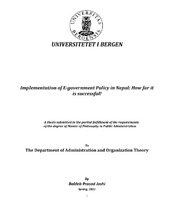| dc.description.abstract | Abstract E-government becomes a powerful tool to inform, interact, transact and network thereby contributing leaner, transparent and cost-effective government in the process of transformation. It can be seen as an important means to enhance value of services to the citizen. It can be a vehicle for economic growth of developing country like Nepal. The study has been an attempt to assess present status of e-government, efforts made in implementing e-government policy and challenges and opportunities associated with it. The study is also intended to understand and explore issues, factors, challenges and barriers and to identify best strategies for implementation of e-government policy in Nepal. This study is case study research design relied on both qualitative and quantitative data. Mixed method approach has been applied using mail questionnaire survey, in depth telephone interview and documentary analysis. Three sets of survey questionnaire were designed for each group of respondents as: policymaker/academician, user of e-government and civil servant for collecting their views relating to various dimensions of e-government in Nepal. The study also involved purposefully selected twelve key respondents comprising of high level bureaucrats, middle level manager, academician, and user of e-government for interview. Based on the key outcomes of analysis the policy recommendations have been suggested for effective implementation of e-government policy in Nepal. My research showed that implementation of e-government policy is moderately successful in Nepal. Despite low level of economic development, weak infrastructure and long political insatiability, Nepal has been trying to achieve its aim to place itself in the Global Map of Information Technology. Necessary laws and regulations have been enacted; several organizations have been created to accelerate activities relating to e-government development and deployment; most of the websites have been established after adopting e-government policy. Users are found highly interested in using e-government services. The number of visitors, the contents and the types of services are in increasing trend. However, the pace for development and deployment is slow due to low priority given to this sector; widened digital divide, weak infrastructure even shortage of electricity and high cost of internet that limit the wide spread use of ICT. Nepal is in first and second stage of e-government maturity; still there is long journey to fully utilize transactional and transformational services. Usefulness and ease of use of e-government services are found most influential factors that affect user decision to adopt e-government. Mainly political instability in the country undermines ability to implement policy effectively. Lack of political support, lack of policymaker and managerial understanding and willingness and traditional mind set of civil servants are most influential barriers to e-government policy implementation in Nepal. Although present law on IT is a mile stone for e-government implementation, it is insufficient and less conducive for effective e-government implementation. On these grounds, therefore, I conclude that not outstanding but notable achievements have been realized regarding e-government development and deployment so far. Putting e-government in top priority with strong political support, sensitization and behavioral modifications for... | en_US |
